Pen&Inq
Oil Change
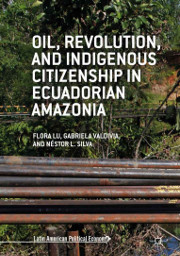
When Ecuador's President Rafael Correa took office in 2007, he restructured and expanded natural resource extraction. Income from those industries, mostly oil, helped fund Correa's developmentalist vision—a "Citizens Revolution"—with purportedly positive social and environmental outcomes.
Yet living conditions in the country's Amazonian region—where oil is extracted—have not experienced the grandiose changes promised by his administration, said Flora Lu, associate professor of environmental studies and UC Santa Cruz provost of Colleges Nine and Ten.
Lu takes a critical look at the Correa administration's "21st century socialism" in her book Oil, Revolution, and Indigenous Citizenship in Ecuadorian Amazonia, coauthored with Gabriela Valdivia, and UC Santa Cruz alum Néstor Silva. Based on decades of fieldwork in Ecuador, much among the indigenous Waorani, Lu explores the complexity of "oil entanglements" as they manifest in the nation's seat of power, Quito, and in three Amazonian communities along different oil roads.
Chance Encounters
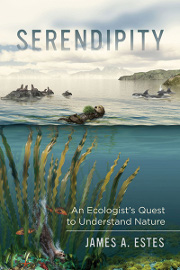
"Science may be a methodical progression of work," said James Estes, adjunct professor of ecology and evolutionary biology, "but a lot of learning happens in a different way."
That premise underlies his book, Serendipity: An Ecologist's Quest to Understand Nature. Blending natural history, principles of ecology, and his own research, Estes recounts the unexpected events that began with a contract job in the Aleutian Islands and continued throughout his career studying sea otters and the impact of top predators on ecosystems.
In a moment underwater, Estes saw that kelp didn't grow where sea otters were absent. Many studies later, he confirmed the connections: sea otters ate sea urchins, keeping urchins from overeating kelp. Although his work started in the Pacific Northwest, the importance of apex predators is worldwide. Whether it's otters, whales, wolves, or elephants: "Big animals matter to ecosystems," he said.
Estes hopes his book encourages students to keep their minds and eyes open to opportunity.
Payment in Kind
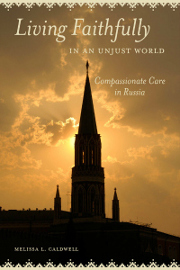
After the collapse of the Soviet Union, many low-income Russians turned to church-run food banks and soup kitchens because the "new" capitalism eliminated most assistance programs. This survival network grew to include NGOs and government agencies, creating a powerful alternative welfare system of people who believed that doing good creates more good.
In her third book, Living Faithfully in an Unjust World: Compassionate Care in Russia, UC Santa Cruz anthropology professor Melissa Caldwell explores the rise of this "compassion economy."
Caldwell chronicled the expanding scope of churches, and the bureaucratic structures they used to manage people, money, and distribution of goods and care. "It's a true market with goods—food, medicine, construction equipment—through which ideas of assistance and compassion circulate," she noted.
It's a self-boosting economy, too. Over and over, people told Caldwell they believed putting kindness into the world creates more kindness.
Perfect Tense
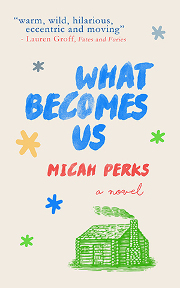
In her most recent book, What Becomes Us, UC Santa Cruz literature professor Micah Perks uses unborn twins' point of view to tell their mother's story; a woman who escapes her controlling husband in Santa Cruz and flees to rural New York to teach in the local high school. There, a controversial book assignment impacts the pregnant teacher, her students, and the community.
The landscapes are familiar to Perks—she was raised in upstate New York and now lives in Santa Cruz. However, contrary to the "write what you know" adage, Perks writes to know.
"My overarching interest is exploring the tensions between individual and community, the I and we," said Perks who lives in an extended, blended family. Writing the novel helped her probe "that central tension between longing to be close with others and being claustrophobic," she said.
UC Santa Cruz students benefit from Perks' real and fictional experiences. Said Perks: "I definitely bring all that back to the classroom."
X Factor
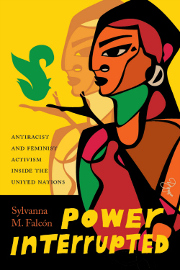
"Where are the women?" came the shouts when an all-male panel closed the NGO Forum Against Racism In South Africa on the eve of the 2001 World Conference Against Racism, Racial Discrimination, Xenophobia, and Related Intolerance.
That lack of inclusion impelled Sylvanna Falcón, associate professor of Latin American and Latino studies at UC Santa Cruz, to add her voice to the outcry; it also inspired her award-winning book, Power Interrupted: Antiracist and Feminist Activism Inside the United Nations.
Sifting through the United Nations' archives, Falcón found the UN routinely addressed concerns raised by women as "women's issues," detached from the broader dynamics of racism.
She also discovered that two of the four women signatories to the UN charter, from Latin America, successfully lobbied for a gender equity clause in the charter. "My book reminds us that it doesn't take many people to make a meaningful change," said Falcón.
Progress is fragile, though. "It's one thing to put words on paper and another to actually live it," she noted.

